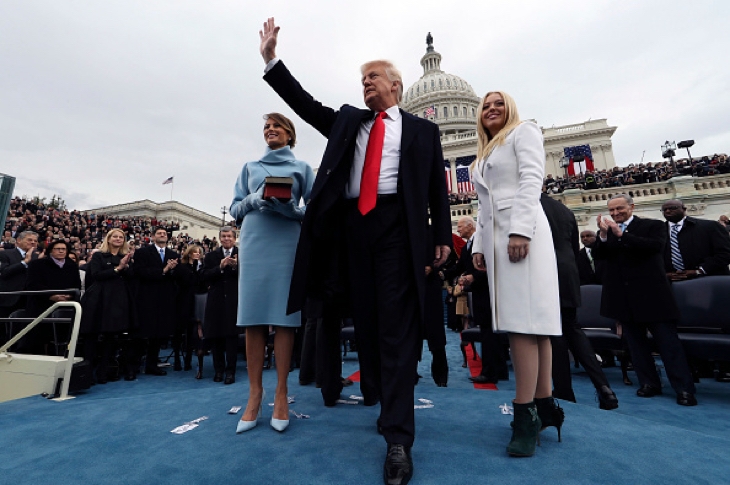We were told Donald Trump would be displaying his “philosophical” side in his inaugural address. To me, sitting beneath a grey Washington sky, it looked pretty much the same as the bombastic side that we saw so much of during the campaign.
In short he stood on the steps of the United States Capitol, symbol of American democracy, surrounded by past presidents, senators and representatives, waved to the crowd and then promised to blow it all up.
He painted a bleak picture of America – all drug-addled families and shuttered factories – just as he had at the convention last year. This time he added a new chapter. “This American carnage stops right here and stops right now,” he said. “We are one nation, and their pain is our pain. Their dreams are our dreams, and their success will be our success. We share one heart, one home, and one glorious destiny.”
He promised to return government to the people, snatching it back from professional politicians who have been living high on the hog. His audience – tens of thousands of people stretching down the National Mall – lapped it up.
I sat among members of an Arkansas delegation, listening to their Southern coos as they admired Melania’s outfit – “very Jackie O” – and fretted about the crowd’s reaction to Barack Obama appearing – “I won’t boo Obama”.
These were old-style Republicans, the sort that existed long before Donald Trump ever thought about entering politics, and who grimaced at the lack of manners displayed as the crowd booed Chuck Schumer, leader of the Democrats in the Senate and the closest thing to an official head of the opposition.
But just as they had been during the campaign, they were thoroughly won over by Trump’s words. The address may have represented a break with tradition, a break with the measured tone expected on a day of pomp and circumstance. But it was met by shrieks and cheers in section 16.
Jonelle Fulmer, who represents Arkansas on the Republican National Committee, said: “He was very powerful. He seemed like the man we elected. We might be seeing the inauguration of the greatest president that American has ever known.”
Melonaie Gullick, President of the Arkansas Federation of Republican Women, agreed. “Direct,” was how she described it. “You feel like he’s the going to turn our nation back around,” she said.
Their words echoed those of other Trump supporters to whom I have spoken in Washington this week. To a man and woman they spoke of taking their country back (language familiar to the Brexit debate in the UK and the cry of populist movements elsewhere).
How that rhetoric plays away from the audience assembled in front of the Capitol is another matter. Trump had been implored to heal the wounds of the election and help heal a divided country. Although he talked about there being no room for prejudice in hearts filled with patriotic pride, and although he explained that a united America was unstoppable, his language may leave a different impression.
Words such as “carnage”, “tombstones”, “robbed” and “rusted-out” negate all the talk of the future. They set a black cloud over the optimism. They are words of blame and retribution, not of hope and the dream of better days. It is a reminder of the bleak vision that motivated his campaign.
While they may stir the faithful, they will not win over those who believe they are losing the country to Trump.
As I was leaving, dawdling behind the crowds who had rushed to follow the presidential parade, I ran into Corey Lewandowski, who ran the first year of the Trump campaign. He told me the speech was just right. “Bang on message,” he said.
That maybe, but perhaps it is time to transition away from campaign rhetoric and start using language for everyone.






Comments